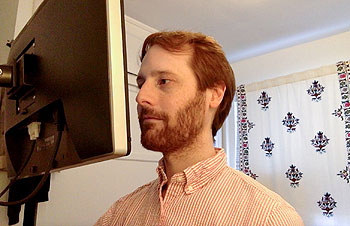Connect
Going In Blind
A visually impaired writer reflects on switching to a zoom room.
Written by Marc Muszynski
 I was secretly excited about the idea of a virtual writers’ room. And not just because I was grateful to keep my TV staff job during quarantine. I’m visually impaired, and for years technology had promised a revolution in communication and opportunity for people with disabilities. This was my chance to push the bold frontier of collaboration, and I didn’t even have to put on jeans!
I was secretly excited about the idea of a virtual writers’ room. And not just because I was grateful to keep my TV staff job during quarantine. I’m visually impaired, and for years technology had promised a revolution in communication and opportunity for people with disabilities. This was my chance to push the bold frontier of collaboration, and I didn’t even have to put on jeans!
People with disabilities make up over 20% of our population but less than 1% of working writers. And one of the excuses is the fear that a disabled writer wouldn’t be able to operate in a traditional writers’ room. This fear drives me nuts because I’ve had a lot of different jobs, and writing is hands down the most accessible one. Try being a legally blind golf caddie. You’d be surprised how many clubs people throw at you.
In a regular writers’ room, I have to find workarounds for a few things: It can be hard for me to see the whiteboards, so I comb through the notes every night and ask a few extra questions during the day; I can’t always catch people’s facial expressions, so I have to pay more attention to the conversation to know when it’s ok to jump in. To date, no one has ever thrown anything at me (at least not on account of my eyes), and honestly, I think my accommodations just make me do my job better. I’m also very lucky to work for an incredible showrunner and with amazing writers who were never that worried about my eyes anyway.
But the Zoom era was dawning: A writing process writ large on my home monitor! A cloud-hosted utopia where I could finally see my coworkers’ beautiful faces and thereby know when not to talk! This could be my time to shine.
I logged into work the next day, ready to embrace the brave new world. And it totally worked...ish. I could see the digital boards, and I even got to type on them. I could see my coworkers’ faces and their adorable children who occasionally snuck into the frame. But it wasn’t the revolution I was hoping for—and not just because my camera angle made it look like my computer was eating me.
Seeing the boards was great. But the digital version wasn’t giving us enough flexibility. The variable sound quality made it tough to track what was going on. And the delay made it even harder not to interrupt. I found myself longing for the good ol’ analog setup.
I didn’t realize how attached I was to our humble office: the posters from previous seasons, the fridge full of Triple Shot La Colombe Draft Lattes, the ghosts who haunted our suite late at night (I never actually saw them, but that’s probably because of my eyes). Most of all, I missed the people. I got to spend every day with a dozen brilliant, accomplished writers, collaborating on a show we all love. It turned out that during a global pandemic, being an extrovert was much worse for me than being visually impaired.
I spent the first week mentally flailing. But if I’ve learned anything from living with a disability, it’s how to adapt (and dodge golf clubs). The dry-erase markers weren’t the ones breaking the story. And the good ideas didn’t come from the Triple Shot La Colombes (no matter what it felt like). Writing is my favorite thing to do. If there’s an opportunity to write, I’ll make it work. So I decided to forget about Zoom and focus on the same three things that worked in person:
1. Listen
2. Think of constructive ideas
3. Communicate those ideas at the appropriate time (see #1)
After a few days, I started to settle in. Some things were easier with my eyes. Some were harder. But the people stayed the same, and in the end, that’s what mattered most. As a team, we found our virtual footing. And I’m just as proud of the stories we created on Zoom as in the room.
There’s still tremendous potential for technology to create new access for me and others in the future. But this experience proved to me that we don’t need to wait for technology. As long as people can communicate, they can write together. Whether in person, on a screen, over the phone, across the world, or through an interpreter, the most important factors are good leaders and cool people. And I’m confident we’ve got enough of those to make anything work.
